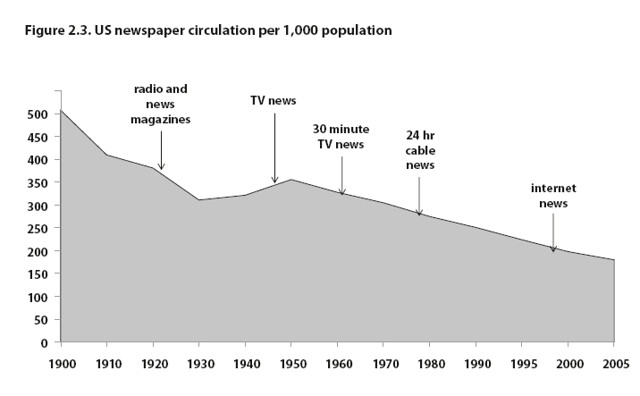“In many cases the internet is not the main challenge facing the business of journalism”, according to a new study released today by the Reuters Institute of Journalism.
This collection of essays, “The changing business of journalism and its implications for democracy”, broadly finds that in comparable developed democracies with similarly high levels of internet use there are massive differences in how the news industry has fared in recent years.
In short the US newspaper industry is really screwed, as is the French one (for completely different reasons), but that doesn’t mean that the UK one necessarily is.
Each market has its own unique problems, and solutions, and the internet is not the cause of all our woes.
Here a few a extracts that I’ve picked out from the book, which will be available for £25 (though it is worth keeping an eye on the Reuters’ Insitute website because they sometimes give digital versions of their reports away for free:
David A. L. Levy
and Rasmus Kleis Nielsen
“Total advertising expenditure is widely expected to grow strongly around the world as the wider economy recovers (as happened in the years after the dot.com bubble burst and after previous recessions).
“Though commercial news organisations in general and newspapers in particular capture only a part of total advertisement expenditures – and in many countries a shrinking part, relatively speaking – renewed growth in advertising is in general good news for the business of journalism.
“While it is uncertain whether we should expect to see such a situation again in the near future, it is worth keeping in mind that in 2006–7 – before the global financial crisis, but more than ten years after graphical web browsers like Mosaic and the spread of dial-up modems started making the internet accessible to a wider audience and after decades of declining circulation – newspapers were very profitable businesses in many countries.
“The average operating surplus amongst the 27 European Union member states was 11 per cent, and operating profits in American newspapers often at 20 per cent. In fact, many American commercial legacy news organisations seem to be facing a more serious crisis than their counterparts elsewhere, and it is by no means certain that this is simply a precursor for things to come around the world.
“The United States may well be more of an exception and less of a forerunner than is sometimes assumed in discussions of international media developments.
Let us just say here that the evidence presented in this book suggests that a one size fits all approach is not what is called for, that there are not only threats, but also plenty of opportunities ahead, and that there is still time and occasion for reinventions of and new investments in quality journalism covering public affairs and offering people the information that they need to act – not simply as consumers, but also as citizens.”
Robert Picard:

“In 2009 the newspaper industry was a $60billion industry (when advertising is combined with circulation income), with an average return of 12 per cent (four times better than other firms). It is not likely to disappear overnight, despite the fears of many in the industry. The contemporary financial problems destroying firms in the industry are not the result of long-term trends, but because recessions create problems for firms that have not properly managed their balance sheets.
“Newspapers, even those operated by the half-dozen firms that have gone bankrupt, were profitable, but not profitable enough to pay their debts. This is evidence of poor financing decisions rather than the unsustainability of the industry.
“It is likely, too, we will see a split in news provision. Elite providers of higher quality news and information with a higher price will coexist with low-cost or free providers of quick and easy news, plus significant amounts of sports, entertainment, and lifestyle information. In many cases, these providers will belong to the same print, internet, or broadcasting company.
“To finance these activities news enterprises will change and require engagement in a variety of new organisational activities. Income will increasingly come from multiple sources – consumers, advertisers, syndication, income from events and unrelated commercial activities, and trusts and donations. The latter, of course, may require new thinking in tax and charities laws.
“As we address how to create a sustainable future for news, and how we can reasonably transform the industry to achieve it, we must focus not on the past but on a vision of the future and how to achieve it. We must focus on what democracy needs, not on what current new enterprises or journalists need. We must focus on how to inform those who are engaged and how to engage those who are not. We must focus on not merely national needs, but regional and local news and information needs as well.
“This requires that we firmly root our efforts in the fundamental values of education, citizenship, and democracy. While we must be pragmatic about the business of news, we must not lose sight of the righteous work in which we are engaged.”
Email pged@pressgazette.co.uk to point out mistakes, provide story tips or send in a letter for publication on our "Letters Page" blog







